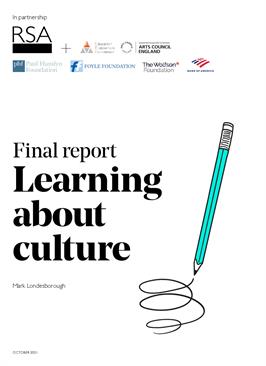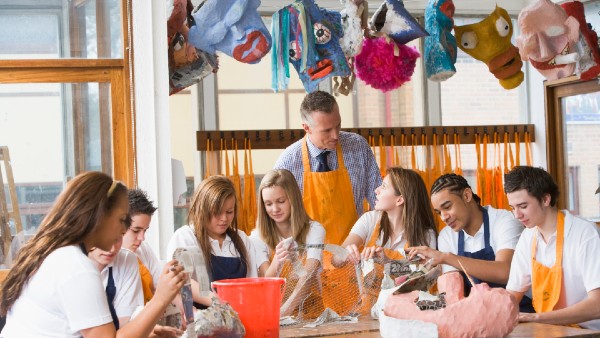This report provides an overview of the RSA’s Learning About Culture project, that began in 2017. The project aimed to improve the evidence base for the impact of arts-based learning on academic outcomes and improve the use of evidence and evaluation in arts-based education.
The project had three main components:
- Five, large-scale evaluations of arts-based learning activities in primary schools, designed to produce robust evidence of causal effects on academic achievement. The evaluations were jointly overseen by the RSA and the Education Endowment Foundation and conducted by a team from the Behavioural Insights Team and UCL Institute of Education. The activities were developed and delivered by: Tees Valley Music Service; London Bubble; Arvon, with the University of Exeter and The Open University; the Centre for Literacy in Primary Education (CLPE) and Paradigm Arts.
- The Cultural Learning Evidence Champions Network: a programme of training and networking for professionals working in arts-based education, to support and advocate for better use of evidence and evaluation in that sector. We also published a handbook for practitioners with guidance on using evidence and evaluation to improve the quality of practice.
- Arts-Rich Schools – an RSA report based on case studies of schools that prioritise the arts.
In addition to detailed suggestions of what practitioners in the education and cultural sectors can learn from these evaluations, this paper makes three general recommendations for policymakers and practitioners, that respond to the results of the trials and insights gleane from the wider Learning About Culture programme.
Recommendations
- Schools should maintain an arts-rich curriculum
The evaluation results indicate that teaching through the arts does not get in the way of children’s progress in literacy. In addition, arts-based approaches provide children and teachers with many other benefits, only some of which are linked to attainment. Doing the arts well in school depends on school-wide commitment, championed at senior leadership level.
2. Advocacy for the arts in education should build on moves in education policy that encourage breadth and balance, rather than focus on generalised claims of impact on attainment.
Impact on pupil attainment isn’t the main reason why schools and cultural sector practitioners provide arts-based learning. The results of the Learning About Culture trials leave us no more certain about a causal relationship between arts participation and improved attainment and suggest that making the case for the arts in schools based on impact on attainment can be confusing for schools. In the context of policy moves towards a broader scope for assessing the quality of school curricula and in the post-Covid context where interest in pupil wellbeing has come to the fore, the importance of demonstrating impact on attainment is waning.
3. Support and encourage stronger relationships between practitioners and the research and evaluation community.
Arts-based learning is often expected by practitioners to facilitate, rather than be the direct cause of improvements in educational outcomes, but this process is not well-enough understood. More research is needed to understand how and when arts-based approaches create a supportive context for improved educational outcomes. Engagement between the practice and research communities can lead to mutual learning and better designed activities, but practitioners can feel intimidated in the unfamiliar milieu of research.
This paper is published alongside individual evaluation reports on the five trials and an overarching report by the evaluators. Those reports provide full detail about the methods, analysis and results of the trials.
Supported by Arts Council England, the Paul Hamlyn Foundation, the Wolfson Foundation, the Foyle Foundation and Bank of America Merrill Lynch.
pdf 781.6 KB
Related articles
-
We need to teach children new forms of literacy
Comment
Lazar Dzamic
Knowing how to read and write is no longer enough. Lazar Dzamic argues that we need to arm our young with new literacies, to fight narratives sold by media, politicians, religion, the entertainment industry and big business.
-
Artificial intelligence: the creative edge
Comment
Alex Soulsby
How should schools respond to AI? Alex Soulsby calls for a greater focus on the arts to help students develop their creativity, critical thinking, adaptability and emotional intelligence.
-
Invitation: Philanthropic networking event
Fellowship news
Innovation professional Jess Denny FRSA invites London Fellows to a philanthropic networking event at The Steps in the RSA House.




